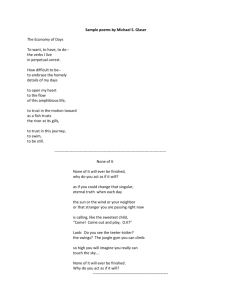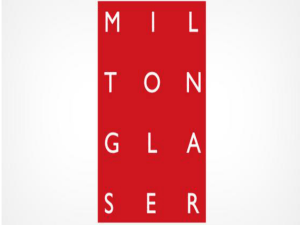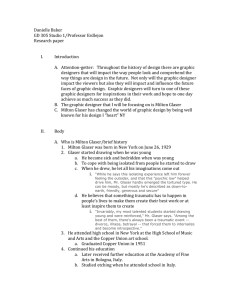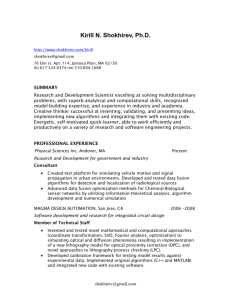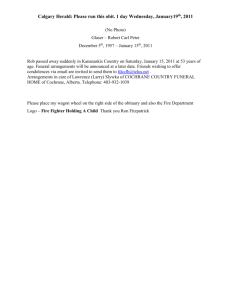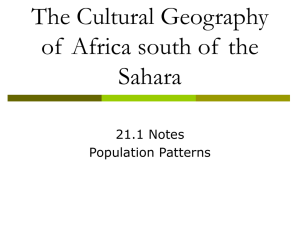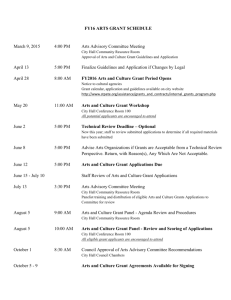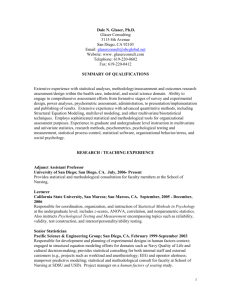Word Document - Glaser Progress Foundation
advertisement
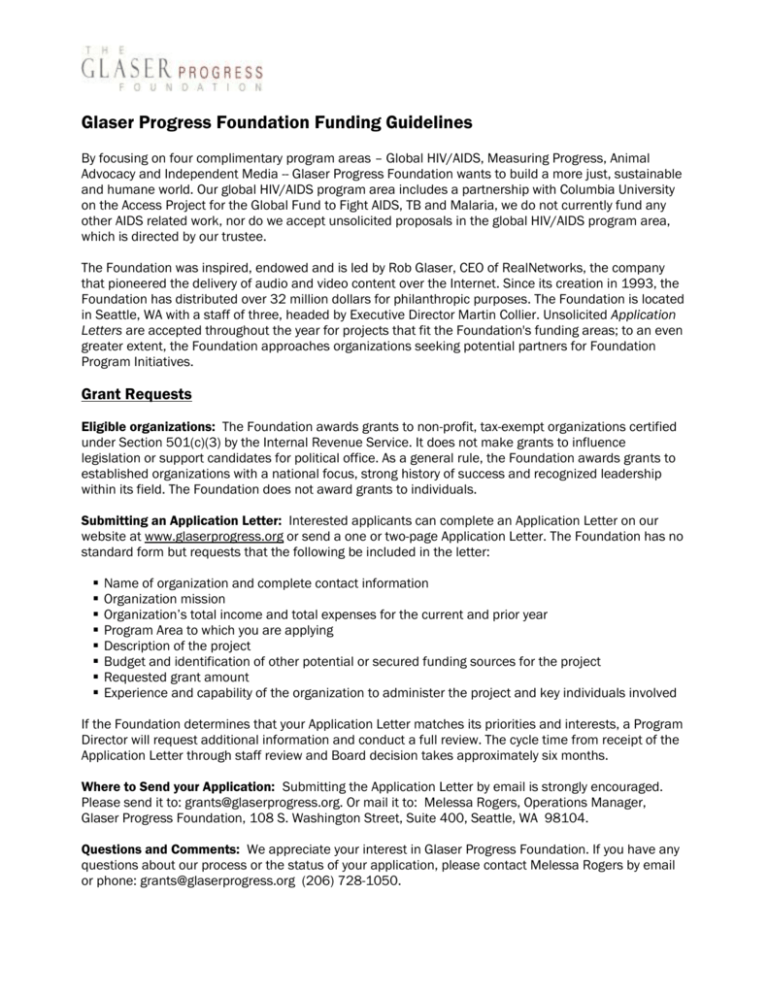
Glaser Progress Foundation Funding Guidelines By focusing on four complimentary program areas – Global HIV/AIDS, Measuring Progress, Animal Advocacy and Independent Media -- Glaser Progress Foundation wants to build a more just, sustainable and humane world. Our global HIV/AIDS program area includes a partnership with Columbia University on the Access Project for the Global Fund to Fight AIDS, TB and Malaria, we do not currently fund any other AIDS related work, nor do we accept unsolicited proposals in the global HIV/AIDS program area, which is directed by our trustee. The Foundation was inspired, endowed and is led by Rob Glaser, CEO of RealNetworks, the company that pioneered the delivery of audio and video content over the Internet. Since its creation in 1993, the Foundation has distributed over 32 million dollars for philanthropic purposes. The Foundation is located in Seattle, WA with a staff of three, headed by Executive Director Martin Collier. Unsolicited Application Letters are accepted throughout the year for projects that fit the Foundation's funding areas; to an even greater extent, the Foundation approaches organizations seeking potential partners for Foundation Program Initiatives. Grant Requests Eligible organizations: The Foundation awards grants to non-profit, tax-exempt organizations certified under Section 501(c)(3) by the Internal Revenue Service. It does not make grants to influence legislation or support candidates for political office. As a general rule, the Foundation awards grants to established organizations with a national focus, strong history of success and recognized leadership within its field. The Foundation does not award grants to individuals. Submitting an Application Letter: Interested applicants can complete an Application Letter on our website at www.glaserprogress.org or send a one or two-page Application Letter. The Foundation has no standard form but requests that the following be included in the letter: Name of organization and complete contact information Organization mission Organization’s total income and total expenses for the current and prior year Program Area to which you are applying Description of the project Budget and identification of other potential or secured funding sources for the project Requested grant amount Experience and capability of the organization to administer the project and key individuals involved If the Foundation determines that your Application Letter matches its priorities and interests, a Program Director will request additional information and conduct a full review. The cycle time from receipt of the Application Letter through staff review and Board decision takes approximately six months. Where to Send your Application: Submitting the Application Letter by email is strongly encouraged. Please send it to: grants@glaserprogress.org. Or mail it to: Melessa Rogers, Operations Manager, Glaser Progress Foundation, 108 S. Washington Street, Suite 400, Seattle, WA 98104. Questions and Comments: We appreciate your interest in Glaser Progress Foundation. If you have any questions about our process or the status of your application, please contact Melessa Rogers by email or phone: grants@glaserprogress.org (206) 728-1050. Measuring Progress Mission: Build a better future by improving our understanding and measurement of human progress. Description: In his first major campaign speech in 1968, Robert Kennedy warned that the Gross Domestic Product (GDP) “measures neither our wit nor our courage, neither our wisdom nor our learning, neither our compassion nor our devotion to country; it measures everything, in short, except that which makes life worthwhile.” How we measure progress may be our ultimate time capsule; it reveals our values and shapes our future. So what does America’s portrait of progress tell us about our collective values and goals? The traditional portrait presented by most of our media and political leaders focuses on the GDP and stock market. But do these measures reflect our most cherished values and aspirations? As we enter the 21st century, Glaser Progress Foundation believes that it is time to begin measuring what we value rather than valuing what we measure. Program Director: Martin Collier Program Initiative: Program on Nonmarket Accounts. Our country’s National Income and Product Accounts (NIPA) are used by government and business to judge our nation’s economic performance over time, to compare the economies of different nations, to measure the nation’s saving and investment and to track the business cycle. The most well-known account is the GDP. But these accounts measure only market activity -- goods and services bought and sold in market transactions -- which distorts their measurement of environmental health and social well-being. Cutting down our nation’s dwindling old-growth forests increases GDP but goes unaccounted for in our nation’s asset accounts. Similarly, because divorce, disease, oil spills and crime generate increased market activity, they drive GDP up and make the country appear better off. Conversely, because many valuable services and goods such as recreation and leisure activities, volunteer work, household labor and investments in human capital generate little or no market activity, they are excluded from the GDP. In order to improve and modernize our national accounting system, Glaser Progress Foundation and Yale economist William Nordhaus developed a ten-year program to build a comprehensive set of nonmarket accounts for the United States. The Program on Nonmarket Accounts (PNA) built the first environmental nonmarket accounts in the areas of forestry and pollution, developed a blueprint for constructing a set of social nonmarket accounts and developed better population time-use data for the United States. The Glaser Progress Foundation has contributed over two million dollars to this program initiative. Grants Awarded: Sightline Institute (formerly Northwest Environmental Watch), www.sightline.org The Foundation awarded Sightline Institute a two-year $100,000 grant to support the development of a regional sustainability index for the Pacific Northwest. Sightline recruited a panel of leading experts to help design, measure and annually update a handful of compelling and scientifically rigorous sustainability indicators. Using these indicators, Sightline produced the Cascadia Scorecard a report on a composite index of regional sustainability. The report gives the media, leaders and the public an alternative to conventional economic measures such as the GDP for tracking the region's progress. Glaser Progress Foundation Funding Guidelines Page 2 of 5 Animal Advocacy Mission: Transform the way animals are treated and perceived by humans. Description: As Mahatma Gandhi famously said, “The greatness of a nation and its moral progress can be judged by the way its animals are treated.” Helping create a more compassionate nation, the Foundation partners with focused, progressive, national animal protection organizations working to help great apes and farmed animals. By doing so we are focusing Foundation resources on the animals most like us, and the animals we like most – too eat. The Foundation also supports select organizations using innovative Internet applications to develop stronger organizational collaboration, create more effective interactive content, reach larger and more diverse audiences and inspire greater public support and action. Program Director: Mitchell Fox Grants Awarded: The Humane Society of the United States, www.animalchannel.org Grants from the Foundation helped AnimalChannel.org, a project of The Humane Society of the United States, become the leading destination for streaming media on animal issues. Staffed by veterans of print, broadcast and digital media, Animal Channel has been at the forefront of the nonprofit community’s use of streaming media with daily updates ranging from original films and documentaries to commentaries and hard news. Animal Channel streams hundreds of hours of animal programming daily on topics as diverse as urban wildlife, whale hunting, international conferences on endangered species, slaughterhouse investigations and pet tips. While reaching for the highest journalistic standards, Animal Channel credibly and persuasively argues for better treatment for animals. Chimpanzee Collaboratory, www.chimpcollaboratory.org Created by the Foundation with grants totaling $1 million, The Chimpanzee Collaboratory was established in October 2000 to increase legal standing, public concern, captivity standards and conservation efforts for chimpanzees. Securing the participation of academics, attorneys, advocates and scientific authorities from eight animal protection organizations, the Initiative’s goal is to foster coordination and collaboration among the primate field’s leading practitioners, resulting in renewed efforts for the chimpanzee -- one of our most compelling and imperiled species. Physicians Committee For Responsible Medicine, www.pcrm.org Ninety percent of the animals used by humans are raised and killed for food production. United States Department of Agriculture figures show that American slaughterhouses kill more than one million animals every hour. While some laws exist to protect animals from cruelty, almost all exempt farmed animals. One law intended to cover farmed animals -- the Humane Slaughter Act -- is sorely inadequate and poorly enforced. One result of high speed, mechanized and un-policed slaughter lines, argues the Physicians Committee for Responsible Medicine, is the increased presence of salmonella, E. coli and other fecal contaminants. The Foundation assisted PCRM in mounting a legal challenge to an industry that is cruel to animals and dangerous to humans. Glaser Progress Foundation Funding Guidelines Page 3 of 5 Independent Media Mission: Strengthen democracy by making independent voices heard. Description: In his book The Media Monopoly Ben Bagdikian writes, “The object of reform is not to silence voices but to multiply them, not to foreclose ideas but to awaken them.” Without a strong and diverse community of independent voices, we cannot build a global democracy much less protect our own. The goal of the independent media community is not to comfort or sell but to inspire and mobilize. It will not bring you Monica, Elian, O.J., Princess Di, or JonBenet. But it will confront you with the faces of war, disease, poverty, racism, environmental devastation and abuse of power. Its limited resources, fear of repression and censorship, and desire to touch and interact with a global audience make the Internet its medium of choice. Its greatest threat is commercialism and its greatest frustration is the so-called digital divide. It currently serves what Howard Zinn calls the “unreported resistance,” the “permanent adversarial culture” – but its real ambition is to give voice to the world’s silent majority. If independent media is to succeed, it must find better ways of extending its reach and translating its voices into concrete action and measurable change. Program Director: Martin Collier Foundation Launches New Initiative: The Glaser Progress Foundation, in conjunction with the Center for American Progress, recently launched a multiyear effort to increase public understanding of what it means to be a progressive given our nation's history and the challenges we face today. The first part of the campaign involves a pilot experiment to begin defining progressivism in the public's mind through a series of distinct advertisements that explain the progressive movement's core values and policy ideas, its historical accomplishments, and its philosophical differences with conservatives. Research shows that many Americans are positively predisposed toward progressivism as an ideology but that many people remain unaware of its proud past and vision for the future. Progressive reformers at the turn of the 20th century led the charge to create decent working conditions; challenge corporate abuse and special privileges for the wealthy; ensure full equality under law; pass social benefits for the poor, elderly, and unemployed; promote humanitarianism and cooperative security; and implement public interest regulations to protect our natural resources, ensure safe food and medicines, and pave the way for a more humane and efficient economy. These reforms set the stage for broad-based economic growth and increased political equality throughout the 20th century. Grants Awarded: Center for American Progress, www.americanprogress.org The Center for American Progress (CAP) is a think tank dedicated to improving the lives of Americans through ideas and action. They combine bold policy ideas with a modern communications platform to help shape the national debate, expose the hollowness of conservative governing philosophy, and challenge the media to cover the issues that truly matter. Founded in 2003, CAP is headed by John D. Podesta, former chief of staff to President Bill Clinton and professor at the Georgetown University Center of Law. CAP is designed to provide long-term leadership and support to the progressive movement. CAP’s ability to develop thoughtful policy proposals and engage in the war of ideas with conservatives is unique and effective. Glaser Progress Foundation Funding Guidelines Page 4 of 5 WITNESS, www.witness.org Co-founded by musician Peter Gabriel, WITNESS strengthens grassroots advocacy by making video and technology tools available to human rights defenders and mobilizes public concern and activism in order to move human rights issues to the forefront of political debate. WITNESS has partnered with over 150 groups from 50 countries to use video to overcome political, economic and physical barriers, and expose human rights abuses to the world via television, grassroots advocacy and Internet broadcasting. Adbusters Media Foundation, www.adbusters.org Unsustainable consumption. Flawed measures of economic progress. A toxic mental environment. Media Concentration. For over ten years, Adbusters Media Foundation has been a pioneer of "social marketing," moving the most critical issues of our time into the public eye in its inimitable, unblinking style. Vancouverbased Adbusters is a global network of self-described social provocateurs and culture jammers -- artists, activists, writers, pranksters, students, educators and entrepreneurs -- inventing a movement befitting the information age. Known for its attention-getting magazine and television subvertisments and unfomercials, Adbusters launched Adbusters TV, an international social activist Internet channel aimed at toppling existing power structures and forging a major shift in the way we live in the 21st century. Global HIV/AIDS Mission: Support the efforts of the Global Fund to Fight AIDS, Tuberculosis and Malaria. Description: The Global Fund to Fight AIDS, Tuberculosis and Malaria is a multi-billion dollar international financing mechanism intended to combat these scourges by dramatically increasing the availability of funding for practical health initiatives. Unlike much international development aid, Global Fund support will be available only to programs that developing countries design and implement themselves. This novel approach means that the ability to continue raising funds from the international community depends on successful results from these country-led programs. The Access Project for the Global Fund is a joint effort of the Glaser Progress Foundation and Columbia University. Founded by Rob Glaser and economist Jeffrey Sachs. The Project offers hands-on strategic planning to governments of developing countries and organizations applying for funding, helping to evaluate existing programs, identify the most successful models and monitor implementation of new programs when those are funded. The Access Project has provided support to Global Fund initiatives in Nigeria, Ethiopia, Malawi, South Africa, Rwanda, Angola, Namibia, and Haiti. Initially, Access Project advisers worked with countries to develop funding proposals. The project currently focuses on building health infrastructure in Rwanda. Program Director: Martin Collier We do not currently fund any other AIDS related work, nor do we accept unsolicited proposals in the Global HIV/AIDS program area. Glaser Progress Foundation Funding Guidelines Page 5 of 5
